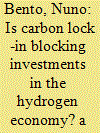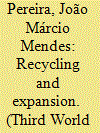| Srl | Item |
| 1 |
ID:
113446


|
|
|
|
|
| Publication |
2012.
|
| Summary/Abstract |
Government policy continues to play a crucial role in the development of wind power industry in China. The 2005 "Renewable Energy Law" and related policies have driven the rapid increase in wind power installed capacity in China over the past half-decade, with capacity doubling annually since 2005. However, a large number of wind farms generate electricity well below their installed capacity, resulting in considerable wastage of resources. Non-grid-connected wind power theory proposes that large-scale wind power output does not necessarily have to be fed into the grid, but can be used directly in industrial production. Thus, the use of the theory can promote the sustainable development of the wind power industry by obviating the need for power grid. In this paper we analyze the influence of government policy on wind power industry from the perspective of institutional change, by employing the basic theories of new institutional economics. A development model for non-grid-connected wind power is proposed in order to implement institutional change in accordance with the specific characteristics of wind power industry in China. This model requires the government to play an active role in institutional development by increasing economic efficiency in order to promote the sustainable development of wind power.
|
|
|
|
|
|
|
|
|
|
|
|
|
|
|
|
| 2 |
ID:
099344


|
|
|
|
|
| Publication |
2010.
|
| Summary/Abstract |
The difficulty of introducing hydrogen and fuel cells in the market stems from the fact that they are not an evolutionary innovation such as biofuels or hybrid cars. Instead they create a disruption in technological utilization. The domination of oil technologies sets a socio-economical context favoring actors involved in the current paradigm, and gives less opportunity to alternative fuels to develop and challenge the status quo. If this hypothesis is correct, then companies interested in the hydrogen economy would not become active because of an unstable context or contradictory interests concerning the replacement of the present system. A review of actions and announcements of main actors shows that technology readiness and the absence of infrastructure are the major justifications to delay investments. Some measures are discussed, which could be deployed in order to reduce uncertainties, such as regulation of carbon emissions from cars, technological subvention, and partnerships for infrastructure implementation.
|
|
|
|
|
|
|
|
|
|
|
|
|
|
|
|
| 3 |
ID:
144267


|
|
|
|
|
| Summary/Abstract |
This article analyses the agenda of the World Bank after the Washington Consensus, arguing that it became more encompassing, politicised and intrusive. This agenda expanded and recycled itself since, in addition to liberalisation, privatisation and macroeconomic adjustment, it also advocated the wide-ranging reconstruction of the economy, the relationship between society and nature, the state, civil society and visions of the world and social practices from a neoliberal perspective. It is argued that the fight against poverty was incorporated by the institution, which functioned as an auxiliary mechanism for this liberalisation. The importance of the incorporation of New Institutional Economics for this expansion and recycling is highlighted.
|
|
|
|
|
|
|
|
|
|
|
|
|
|
|
|